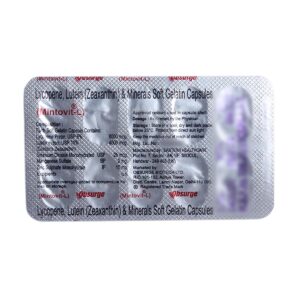VITAMIN A + LYCOPENE + LUTEIN
Vitamin A: Vitamin A, also known as retinol, is a fat-soluble vitamin that plays a crucial role in maintaining vision, promoting growth and development, and supporting the immune system. It is obtained from both animal and plant food sources, with animal sources such as liver, fish, and dairy products being the most potent providers.
As a medication, Vitamin A is primarily utilized to treat Vitamin A deficiency. It is often prescribed to individuals who have a poor diet or have conditions that impair the absorption of nutrients, such as certain gastrointestinal disorders or liver diseases. Additionally, Vitamin A derivatives like retinoids are used topically to treat skin conditions such as acne and psoriasis.
The mechanism of action of Vitamin A involves its conversion to retinal, which is a key component of the light-sensitive molecules in the retina of the eye. This conversion allows retinal to bind with opsin, forming rhodopsin, a molecule essential for the initial steps of the visual process. In addition, Vitamin A plays a vital role in gene expression, cell differentiation, and maintaining the integrity of epithelial tissues.
The recommended daily dose of Vitamin A varies based on age, sex, and specific health conditions. For adults, the average daily recommended dietary allowance (RDA) is 900 micrograms (µg) for males and 700µg for females. In cases of Vitamin A deficiency, higher doses may be prescribed under medical supervision.
Although Vitamin A is essential for normal bodily functions, excessive intake can lead to toxicity, known as hypervitaminosis A. Symptoms of Vitamin A toxicity include nausea, headache, dizziness, blurred vision, hair loss, and bone or joint pain. Long-term and excessive consumption of Vitamin A supplements should be avoided, especially during pregnancy, as it may harm the developing fetus.
It is important to note that Vitamin A should only be taken under the guidance of a healthcare professional, as self-medication with high doses can be harmful. Additionally, individuals taking medications such as isotretinoin or other retinoids should avoid Vitamin A supplementation, as it can lead to an increased risk of toxicity.
Lycopene: Lycopene is a naturally occurring compound and a member of the carotenoid family, which gives certain fruits and vegetables their red color. It is commonly found in tomatoes, watermelon, pink grapefruit, and other foods.
Lycopene is primarily used as a dietary supplement due to its potential health benefits. It is known for its antioxidant properties and has been linked to various health protective effects, including reducing the risk of certain types of cancer, cardiovascular diseases, and age-related macular degeneration.
The exact mechanism of action of lycopene is not well understood, but it is believed to work mainly as an antioxidant, neutralizing free radicals in the body that can cause damage to cells and DNA. Lycopene also has anti-inflammatory properties and may help regulate cell growth and differentiation.
The recommended daily dose of lycopene varies depending on the specific health condition being targeted. However, typical doses range from 4 to 30 milligrams per day. It is important to note that lycopene is better absorbed by the body when consumed with a source of fat, such as olive oil or avocado.
Overall, lycopene is considered safe for most people when taken in recommended doses. However, high doses and long-term use may cause certain side effects including diarrhea, indigestion, and a temporary decrease in blood pressure. Lycopene supplements should be used cautiously by individuals taking anticoagulant medications, as it may increase the risk of bleeding.
As with any supplement or medication, it is always important to consult with a healthcare professional before starting or changing your regimen to ensure it is safe and appropriate for you.
Lutein: Lutein is a naturally occurring carotenoid pigment found in various fruits, vegetables, and plants. It is widely known for its antioxidant properties and is commonly used as a dietary supplement for eye health.
Lutein is primarily used to prevent and treat age-related macular degeneration (AMD), a progressive eye condition that causes vision loss. It helps to protect the macula, the part of the eye responsible for sharp, central vision, from damage caused by oxidative stress and harmful blue light.
The exact mechanism of action of lutein is not fully understood, but it is believed to work by filtering blue light and reducing oxidative damage to the retina. It also has anti-inflammatory properties that may further protect the eye.
The recommended daily dose of lutein varies depending on the condition being treated. For AMD prevention, a typical dose ranges from 6-10 mg per day. However, for those already diagnosed with AMD, higher doses of around 10-20 mg per day may be recommended. It is important to follow the specific dosage instructions provided by a healthcare professional or as indicated on the supplement packaging.
Lutein supplements are generally well-tolerated, and side effects are rare. However, a few potential side effects can occur, including gastrointestinal disturbances such as nausea, stomach cramps, and diarrhea. In some cases, lutein supplementation may cause yellowing of the skin, a condition known as carotenodermia. This is usually harmless and reversible upon discontinuation of the supplement.
While lutein supplements are generally safe for most individuals, it is always advisable to consult with a healthcare professional, especially if you have any pre-existing medical conditions or are taking other medications or supplements. They can provide personalized dosage recommendations and ensure optimal safety and efficacy.

